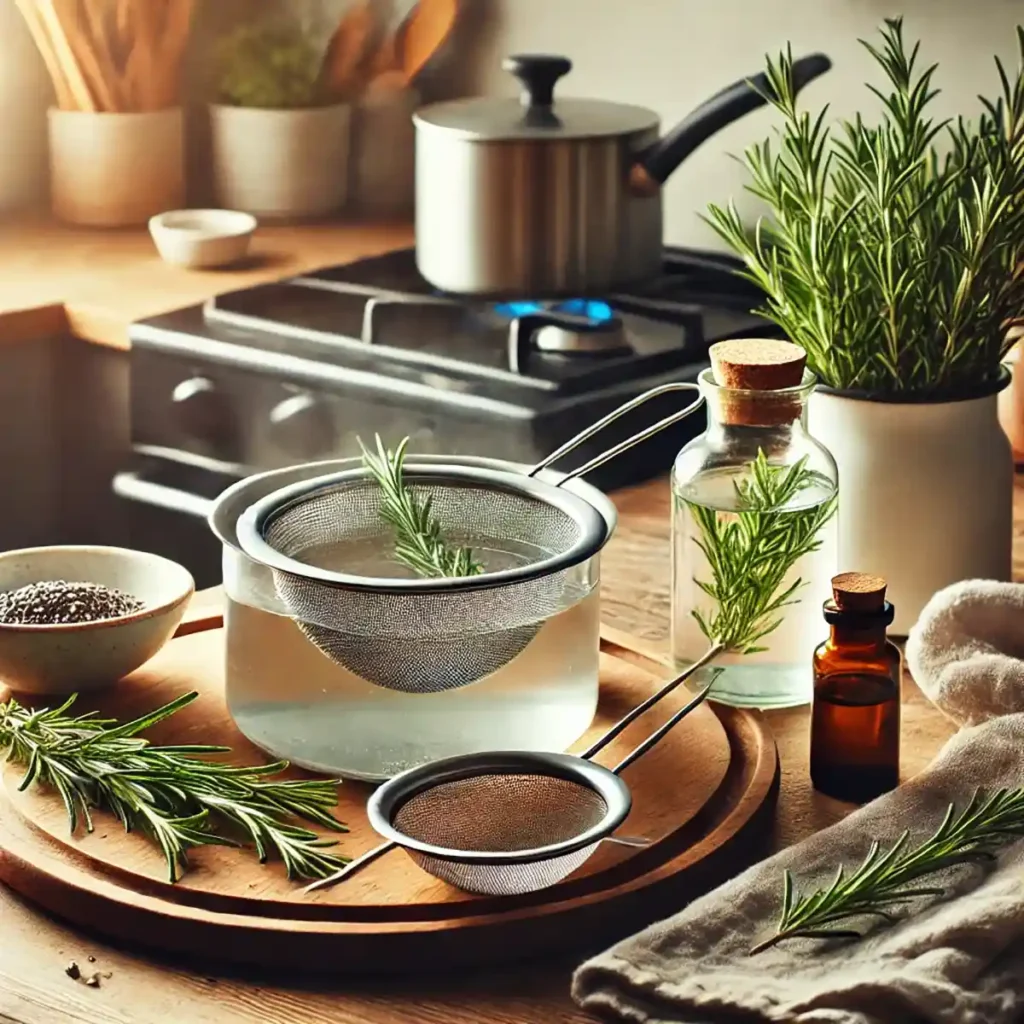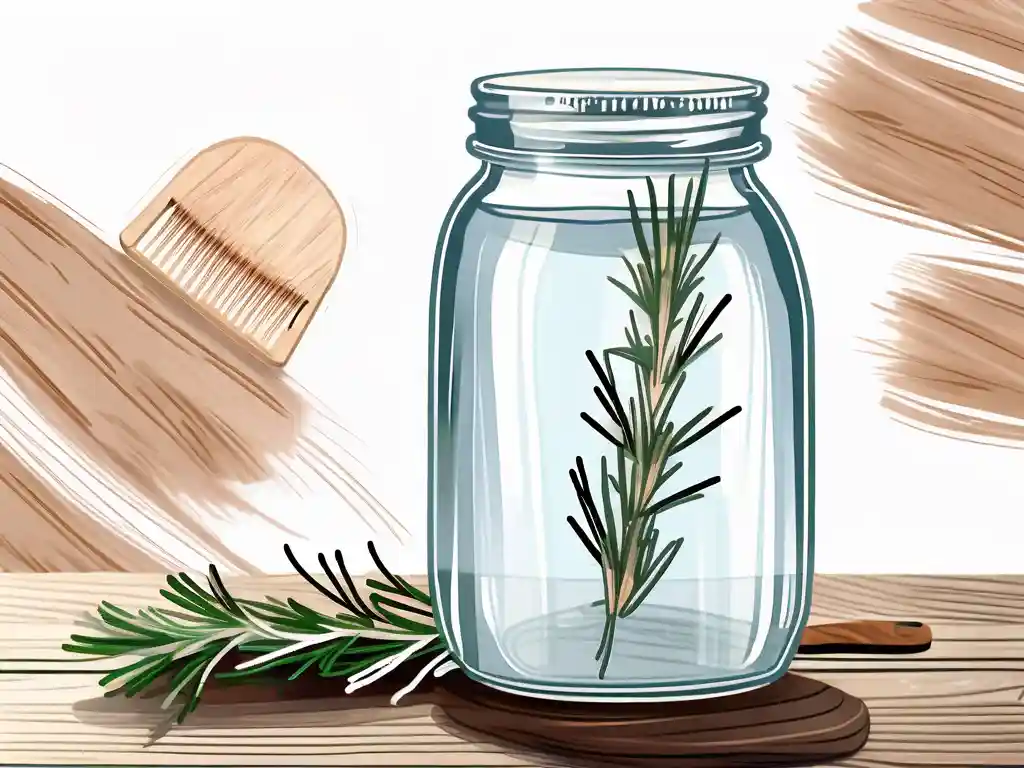Are you tired of dealing with dry, damaged hair? Looking for a natural remedy that can promote hair health and give your locks a beautiful shine? Look no further than rosemary water! In this article, we will delve into the benefits of rosemary water for hair care and learn how to make rosemary water for hair at home.
Understanding the Benefits of Rosemary Water for Hair
Before we dive into the recipe, let’s explore why rosemary water is so beneficial for your hair. Rosemary contains a plethora of nutrients that can nourish your scalp and hair follicles, resulting in stronger and healthier hair growth.
Rosemary has been used for centuries in traditional medicine and beauty practices due to its remarkable properties. This fragrant herb is not only known for its culinary uses but also for its therapeutic benefits. The essential oils present in rosemary have stimulating effects that can invigorate the scalp and promote hair growth. Its natural astringent properties can help balance the scalp’s oil production, making it a versatile ingredient for various hair types.
Nutritional Content of Rosemary
First and foremost, rosemary is rich in antioxidants, which can protect your hair from damage caused by free radicals. It also contains vitamins A, C, and E, which can help nourish your scalp and improve blood circulation. Additionally, rosemary is packed with minerals like iron, calcium, and magnesium, which are essential for promoting hair growth.
Moreover, the scent of rosemary is known to have mood-boosting properties, creating a relaxing and rejuvenating experience during your hair care routine. This aromatic herb can provide a sensory escape while you treat your hair to its numerous benefits.
How Rosemary Water Promotes Hair Health
When used as a hair rinse, rosemary water can work wonders for your tresses. It helps to unclog hair follicles, remove excess oil and product buildup, and stimulate hair growth. The antifungal and antibacterial properties of rosemary also make it effective in fighting dandruff and other scalp irritations.
In addition to its scalp-nourishing qualities, rosemary water can also add shine and luster to your hair, leaving it looking healthy and vibrant. Regular use of rosemary water can contribute to overall hair health and enhance the natural beauty of your locks.

Gathering Your Ingredients
Now that you understand the benefits of rosemary water, let’s gather the ingredients you’ll need to make your own at home.
Before you start creating your rosemary water, it’s important to understand the significance of each ingredient and how they contribute to the final product. The process of selecting the right rosemary and additional components can greatly impact the quality and effectiveness of your rosemary water.
Choosing the Right Rosemary
The first crucial step is to choose fresh rosemary sprigs. You can find them at your local grocery store or even grow your own rosemary plant. Look for vibrant green sprigs with a strong aroma, as these are indications of freshness.
When selecting rosemary, consider the origin of the herb and whether it has been grown organically. Organic rosemary is free from pesticides and chemicals, ensuring a purer end product. Additionally, the time of harvest can affect the potency of the herb, with younger sprigs often possessing a more intense flavor and aroma.
Other Essential Ingredients for Rosemary Water
Aside from rosemary sprigs, you’ll need filtered water and a pot for boiling. It’s also great to have a fine-mesh strainer or cheesecloth on hand to strain the rosemary water after it’s boiled. Lastly, you may opt to add a few drops of essential oils like lavender or peppermint for a pleasant fragrance.
Filtered water is essential for ensuring that your rosemary water remains pure and free from impurities that may alter its properties. The choice of essential oils can add a personalized touch to your rosemary water, enhancing its aroma and potential therapeutic benefits. Consider experimenting with different combinations to find a scent that resonates with you.
Step-by-Step Guide to Making Rosemary Water
Preparing the Rosemary
Begin by selecting fresh rosemary sprigs, preferably organic, to ensure the highest quality for your rosemary water. Rinse the rosemary sprigs under cold water to remove any dirt or impurities, enhancing the purity of your final product. Then, delicately pat them dry with paper towels or a clean cloth, taking care to handle the fragrant sprigs gently.
Did you know? Rosemary is not only a culinary herb but also a popular ingredient in skincare products due to its antioxidant properties and soothing aroma.
Boiling Process
Next, fill a pot with sufficient filtered water, preferably distilled, to avoid any impurities that may affect the taste and quality of your rosemary water. Bring the water to a gentle boil over medium heat, allowing the steam to carry the herbaceous scent of rosemary throughout your kitchen.
Fun fact: Rosemary has been used since ancient times for its medicinal properties, believed to improve memory and concentration, making it a versatile herb beyond its culinary uses.
Simmering and Infusion
Once the water reaches a rolling boil, carefully drop in the prepared rosemary sprigs, watching as the water transforms into a fragrant infusion. Let the rosemary simmer in the water for about 15-20 minutes, allowing the heat to coax out the beneficial compounds and essential oils from the herb.
Cooling and Storing Your Rosemary Water
After the boiling process, remove the pot from the heat and let it cool down for a few minutes, allowing the flavors to meld and intensify. Once the rosemary water has reached a comfortable temperature, strain it using a fine-mesh strainer or cheesecloth to separate the softened rosemary sprigs from the infused liquid. Transfer the aromatic rosemary water into a clean container, such as a glass bottle, to preserve its freshness and potency.
Pro tip: For an added touch of luxury, consider adding a few drops of rosemary essential oil to your homemade rosemary water for an extra burst of fragrance and therapeutic benefits.

How to Use Rosemary Water for Hair Care
Now that you have made your homemade rosemary water, it’s time to explore the different ways you can incorporate it into your hair care routine. Rosemary water is not only simple to make but also offers a multitude of benefits for your hair, such as promoting hair growth, preventing dandruff, and adding shine to your locks.
One additional way to use rosemary water for your hair is to mix it with your favorite hair oil or conditioner. This combination can provide added nourishment and hydration to your hair, leaving it soft and manageable. Simply mix a few tablespoons of rosemary water with your chosen hair oil or conditioner and apply it to your hair after shampooing.
Applying Rosemary Water to Your Hair
After shampooing your hair, pour the rosemary water onto your scalp, focusing on the roots. Gently massage your scalp for a few minutes to promote blood circulation. You can then let the rosemary water sit on your hair for about 5-10 minutes before rinsing it off with cool water. This process not only helps in nourishing your scalp but also imparts a refreshing aroma to your hair.
Frequency and Duration of Use
For best results, try using rosemary water as a hair rinse once or twice a week. However, everyone’s hair is different, so you may want to experiment with different frequencies to find what works best for you. Remember to listen to your hair and adjust your usage accordingly. Consistent use of rosemary water can lead to healthier and more vibrant hair over time.
Potential Side Effects and Precautions
It’s important to note that even though rosemary is considered safe for most people, some individuals may still experience adverse reactions. These reactions can range from mild skin irritation to more severe allergic responses, so it’s crucial to be cautious, especially when using a new product for the first time.
Possible Allergic Reactions
If you have a known allergy to rosemary or other herbs from the Lamiaceae family, such as mint or basil, it’s best to avoid using rosemary water. Patch testing is also recommended for individuals with sensitive skin to ensure there are no adverse reactions.
In addition to skin allergies, some people may also be sensitive to the strong aroma of rosemary. This sensitivity can manifest as headaches or respiratory issues when exposed to the scent for an extended period. If you notice any discomfort while using rosemary water, it’s advisable to discontinue use and seek advice from a healthcare provider.
When to Consult a Professional
If you experience any adverse reactions like itching, redness, or swelling after using rosemary water, discontinue use immediately and consult a dermatologist or healthcare professional for further guidance.
Furthermore, individuals with underlying medical conditions or pregnant and nursing women should seek medical advice before incorporating rosemary water into their hair care routine. While rosemary is generally safe for external use, it’s always best to err on the side of caution when it comes to your health and well-being.
In conclusion, rosemary water is a natural and highly effective remedy for promoting hair health. By incorporating this simple DIY hair rinse into your routine, you can enjoy stronger, healthier, and more vibrant locks. So, gather your ingredients, follow the step-by-step guide, and get ready to experience the wonders of rosemary water for yourself!



